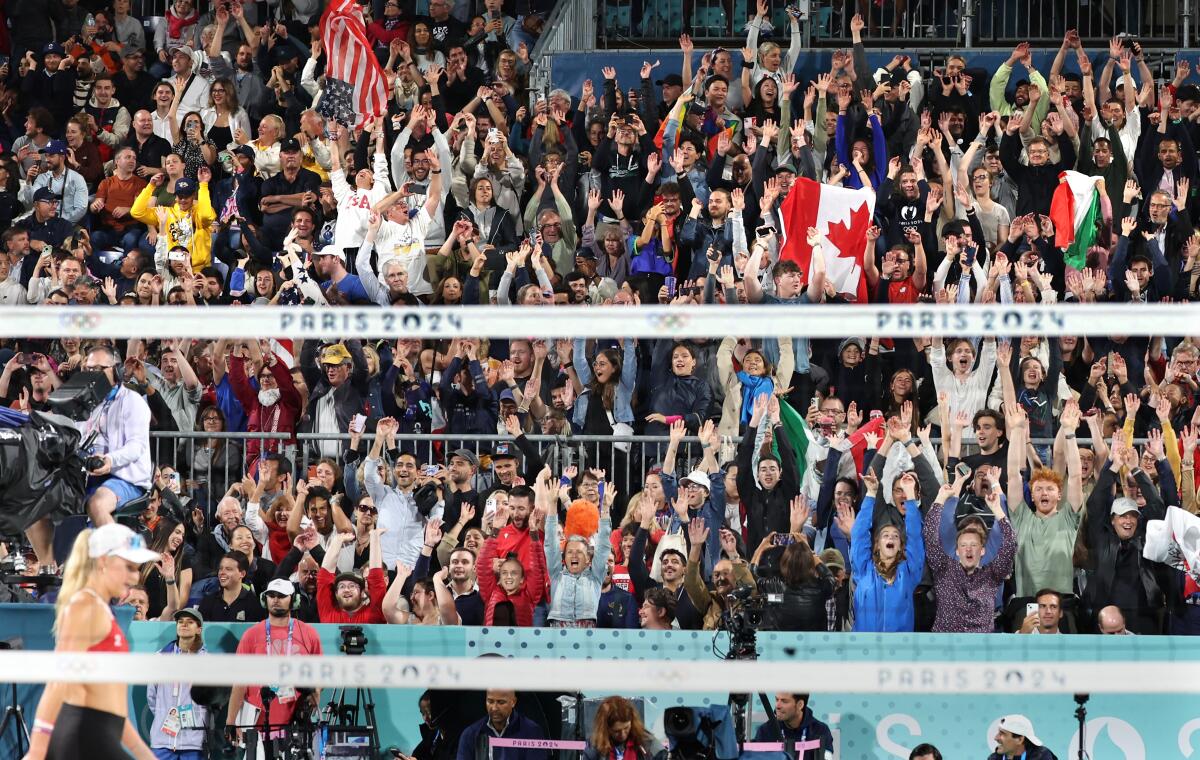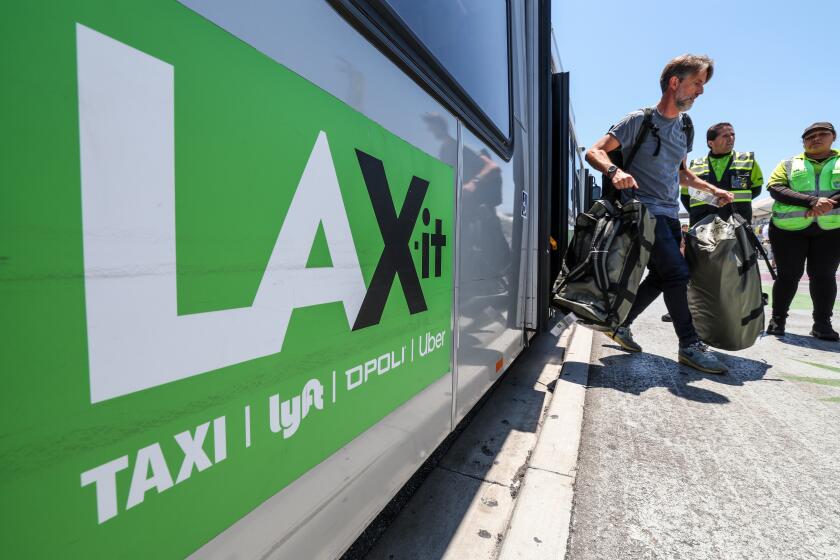Here’s how L.A. tourism workers are mobilizing ahead of the 2028 Olympics
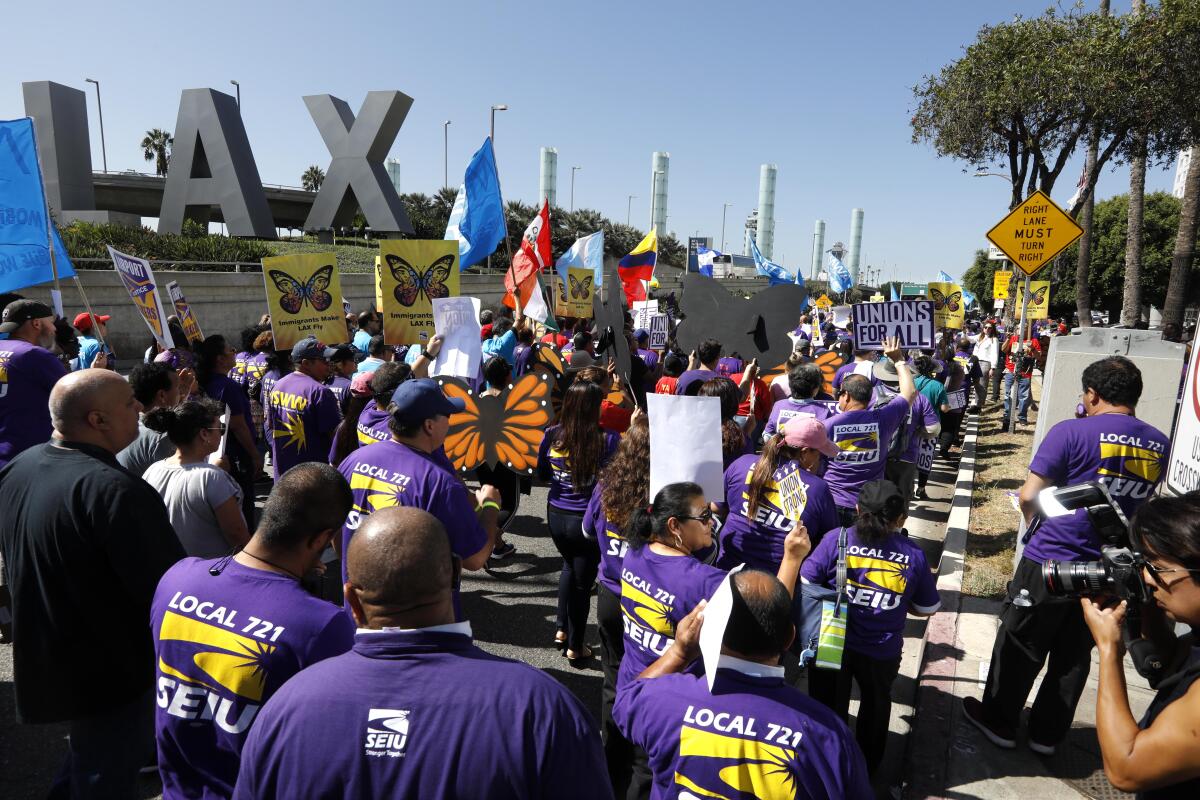
Good morning. It’s Wednesday, July 31. Here’s what you need to know to start your day.
- How labor is mobilizing ahead of L.A.’s Olympics
- Simone Biles leads dominant U.S. to gold in Olympic gymnastics team competition.
- The Nixon fire in southern Riverside County spread rapidly, forcing evacuations.
- And here’s today’s e-newspaper
You're reading the Essential California newsletter
Our reporters guide you through our biggest news, features and recommendations every morning
You may occasionally receive promotional content from the Los Angeles Times.
Tourism workers call for an ‘Olympic’ wage ahead of 2028 Games
When LA28 — the private organization tasked with organizing and raising billions for the 2028 Summer Olympics — campaigned for and eventually secured the Games for Los Angeles, they vowed the mega-event would “bring employment opportunities, economic benefit and pride to people across Los Angeles.”
A coalition of labor unions wants to ensure that roughly 36,000 L.A. tourism workers see some of that prosperity in the form of an “Olympic wage.”
At a rally outside L.A. City Hall on Tuesday, accompanied by some City Council members, a coalition representing workers at LAX, hotels and other tourism sectors renewed calls for an immediate boost in workers’ minimum wage to $25 an hour, with incremental increases to $30 an hour by 2028.
Tourism workers “greet the world,” Estuardo Mazariegos, local co-director of the Alliance of Californians for Community Empowerment Institute, said during the rally. “We need to make sure that our folks have the dignity, have the ability to live where they work.”
What do we want? An OLYMPIC WAGE! When do we want it? NOW! #TourismWorkersRisingLA motion aims to raise the wage for over 36,000 tourism workers to $25/hour immediately, $30/hour by the 2028 Olympics, and give workers access to quality health care. ❤️💜 pic.twitter.com/y8hiZr2TaT
— LAANE (@LAANE) July 30, 2024
‘We need this’
As the city’s tourism industry bounces back to near pre-pandemic levels, labor advocates say the Olympics could be a boon to corporations, while a bane to the low-wage workers who keep LAX, hotels and the rest of the city’s tourism engine running smoothly.
“It’s appalling to think that while the tourism industry has its future growth secured, our families are fighting to keep a roof over their heads,” Councilmember Curren Price said during the rally.
Price co-wrote a motion in April 2023 proposing the pay increases, and a city report was commissioned later that year to analyze the economic impact of raising wages. It is expected to be released within two weeks, said Chief Legislative Analyst Sharon Tso. But this lengthy timeline has frustrated labor groups.
“We were anticipating that this … would take maybe about three to four months, and we’re well beyond that,” Anton Farmby, vice president of SEIU United Service Workers West, told me this week. “We believe that the time is now.
“Here we are with a great opportunity to increase the living wage for these workers so that they can not only work in this city, but live in this city,” he added.
One of those workers is Jovan Houston, a passenger service agent at LAX. She said her job is stressful and demanding — and she’s making just $19.78 an hour.
“It’s like a slap in the face to work so hard for so little pay,” she told me.
Houston said better wages would allow her to stop living paycheck to paycheck and spend more time with her family.
“Enough is enough,” she said. “We need this.”
The Hotel Assn. of Los Angeles, Asian American Hotel Owners Assn. and the California Hotel & Lodging Assn. first voiced opposition to the proposed wage increases in 2023, citing the ongoing pandemic recovery.
“It is proposals like these that have led to the city’s reputation as a difficult place to do business and to work,” spokesperson Peter Hillan told The Times last year.
Looking back to ’84 and looking forward
The 1984 Olympics in L.A. is generally seen as a success in economic terms, as the city is one of the few that made money from the Games rather than losing it. But the ’84 legacy also includes homeless sweeps and aggressive policing that critics say caused enduring harms to marginalized communities.
In terms of labor, the organization behind 1984 was “super corporate, hyper private” and mostly shut out labor unions, said Mindy Chen, director of the Dolores Huerta Labor Institute and professor of labor studies at Los Angeles Trade-Tech College.
But the region has changed a lot since then, she said, and workers are too powerful to be ignored this time around.
“The difference is that now L.A. is a union town,” Chen said, a change made possible by a labor revitalization in the late 1980s and through the 1990s that’s now cemented.
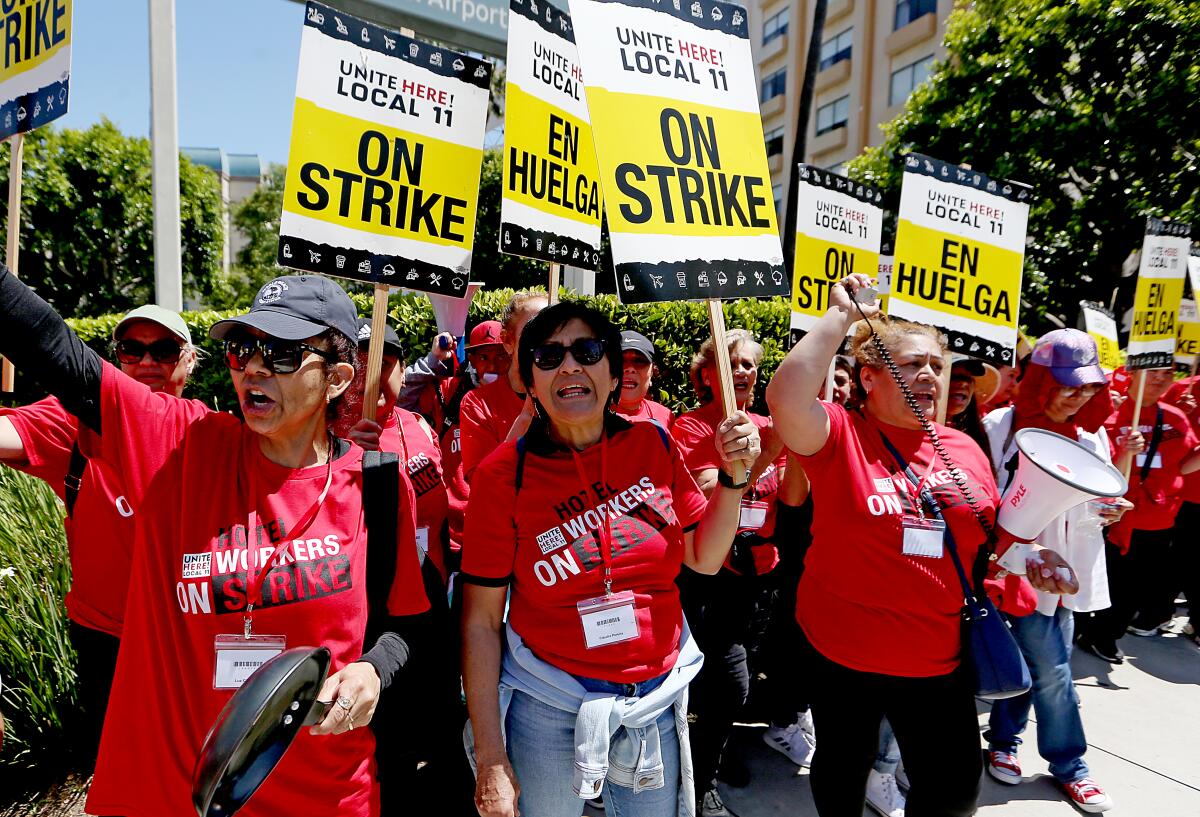
And it’s noteworthy to her that labor leaders are among LA28’s committee and board members.
There could still be plenty of tension, she said, adding that Airbnb is one of LA28’s partners, which unionized hotel workers aren’t thrilled about. More than 15,000 of those workers participated in strikes in L.A. and Orange counties over the last year to secure better contracts.
Something else Chen will be watching: Dozens of those hotel contracts are set to expire just before the 2028 Games.
“That’s forward thinking,” she said. “This gives [the union] a huge bargaining chip and leverage.”
Chen is optimistic that the city’s strong union presence will lead to “a collaborative approach” with Olympic organizers and result in “all the things that labor wants in terms of local hires, lasting benefits, union jobs.”
“When you bring labor to the table, labor is going to demand at the table,” she said.
Today’s top stories
Paris Olympics
- Follow our live coverage from Paris and access today’s TV schedule.
- Last U.S. Olympic 10,000-meter winner believes Grant Fisher can win the race in Paris.
- Simone Biles leads dominant U.S. to gold in Olympic gymnastics team competition.
- Surprise! Olympians in Paris finally swim and compete in the Seine.
- ‘We just made history.’ U.S. women’s rugby sevens revel in bronze-medal showing.
- Right place, right time: The story behind the viral surfing photo from the Paris Olympics.
Wildfires and earthquakes
- Nixon fire in southern Riverside County spreads rapidly, forcing evacuations.
- California wildfires have already charred 30 times as many acres as all of last year — and it’s still summer.
- Why an earthquake felt terrifying to some, nothingburger to others in L.A. — even in the same building.
- Magnitude 4.9 earthquake shakes Southern California.
U.S. Elections
- Black women, white dudes, crazy cat ladies: Identity groups fuel a groundswell for Harris.
- Acting Secret Service head “ashamed” rooftop wasn’t secure at rally where Trump was shot.
Courts and crime
- California’s largest police group says rural departments need more money, but spending is already up.
- L.A. County supervisors reaffirm policy against jailing homeless people after anticamping high court ruling.
- Personnel complaint lodged against LAPD officer who punched handcuffed man.
- Smash-and-grab robbers coordinated crimes on social media. Eight culprits now face prison.
- L.A. City Council upholds Bass veto, killing proposal to let police chief fire officers.
- ‘Significant victory’: More than 80 arrested in copper wire theft crackdown.
More big stories
- UC sets new record with largest, most diverse class of California students for fall 2024.
- Did Mayor Karen Bass just save outdoor dining in L.A.?Did Mayor Karen Bass just save outdoor dining in L.A.?
- Hamas leader Ismail Haniyeh killed in Tehran, group says, blaming Israel.
- The trek from your plane to LAX’s ride-share lot can be a struggle. Will it get easier?
- Disneyland workers ratify contract that averted strike.
- Prolific restaurateur Steven Arroyo of Cobras & Matadors, Escuela Taqueria and more dies at 55.
- Long, frustrating waits for home care persist despite California expanding the program.
- Search suspended for 15-year-old swimmer who went missing off Huntington Beach.
- As human cases of bird flu grow, feds say flu vaccine could help prevent a new pandemic.
- ‘The virus wants to live.’ Why California’s COVID spike isn’t expected to ease anytime soon.
Get unlimited access to the Los Angeles Times. Subscribe here.
Commentary and opinions
- Lorraine Ali: Man up, MAGA. White Dudes for Harris are here.
- Robin Abcarian: The Supreme Court is out of control. Here’s what it will take to rein it in.
- Jonah Goldberg: It’s hard sharing a party with Trump or Vance. They taint the right’s gThe Supreme Court is out of control.ood ideas.
Today’s great reads
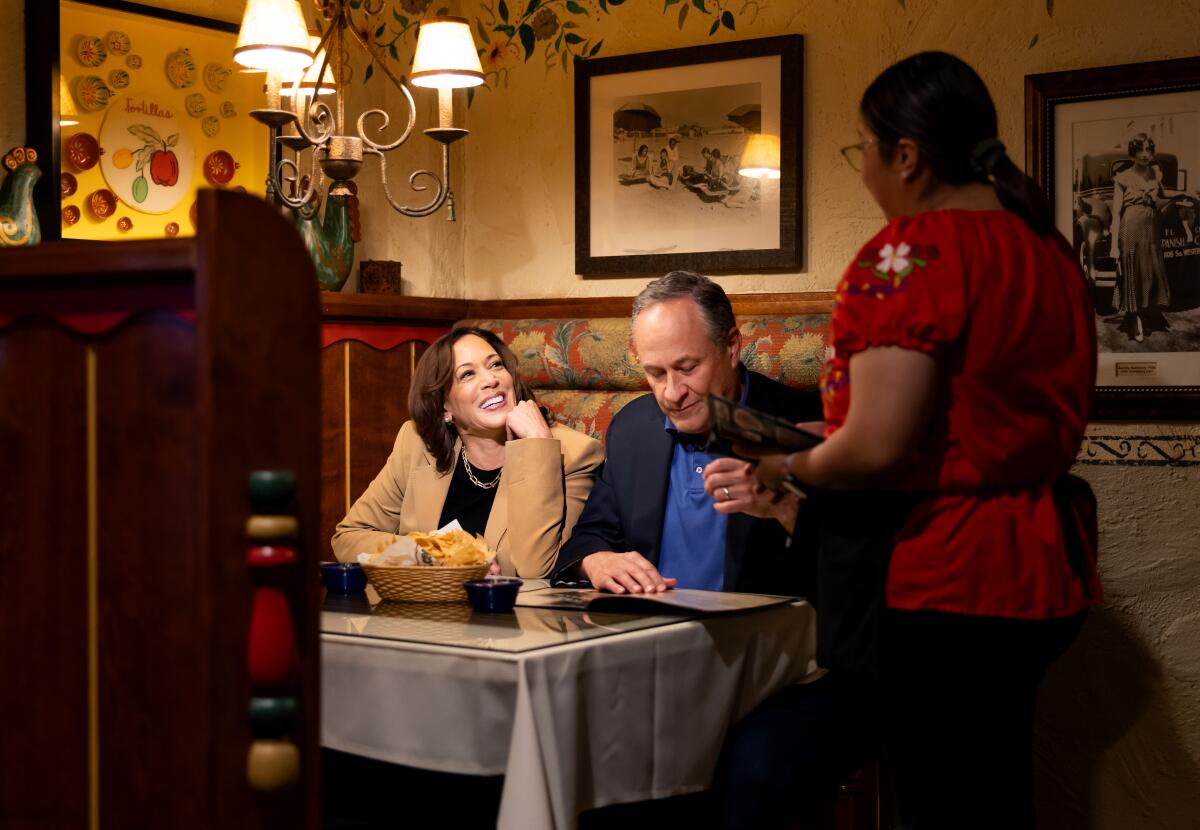
Kamala Harris is a cook — and she knows her L.A. restaurants. Will it help her win? Vice President Kamala Harris is a gourmand — one who knows how to brine a turkey, and where to find good Oaxacan food in L.A. She’s made it part of her political persona.
Other great reads
- Is ever OK to tell your friend to break up with their partner?
- A music executive owns Joshua Tree’s most stunning home. Two local artists say he drugged them there.
How can we make this newsletter more useful? Send comments to essentialcalifornia@latimes.com.
For your downtime
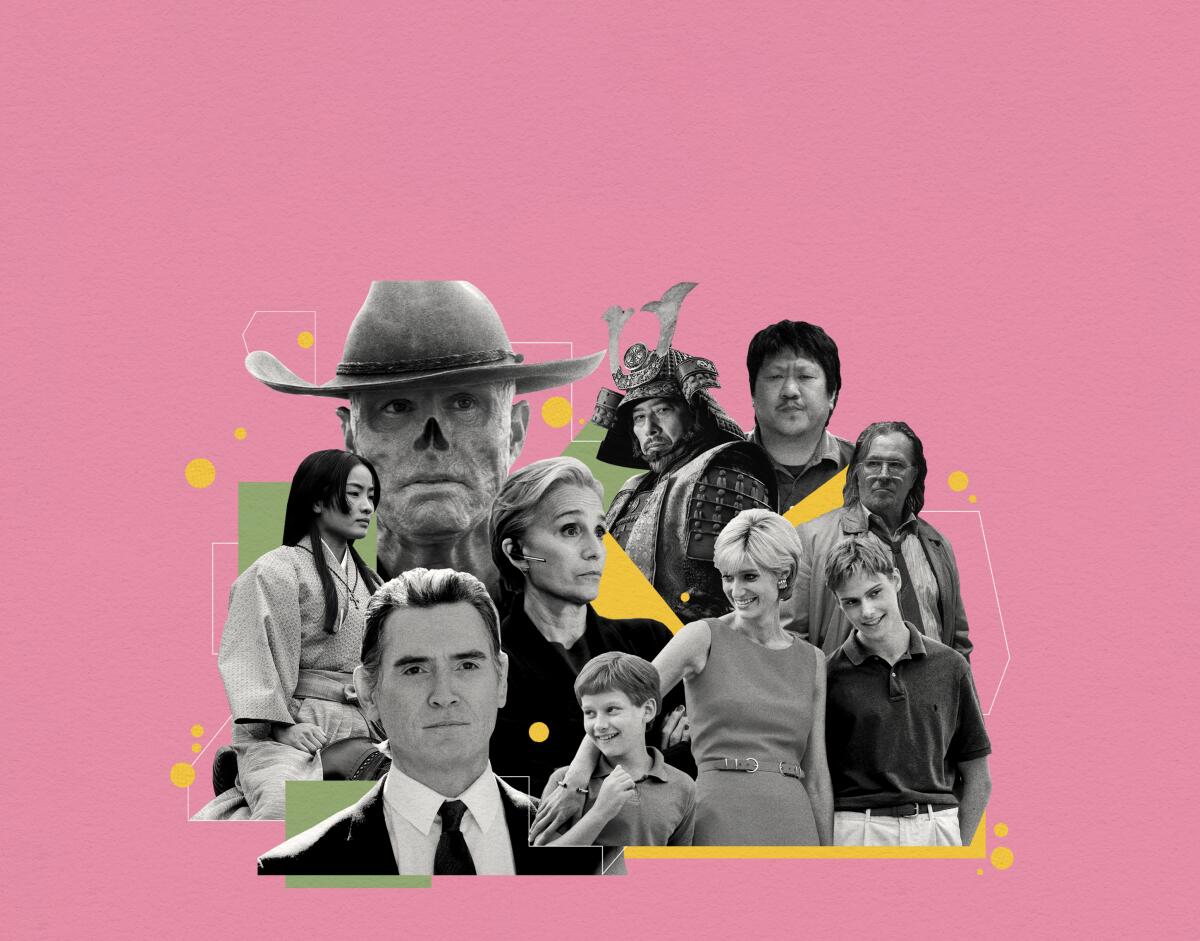
Going out
- 🥾 Hosting a guest who wants to hike? Here are 17 L.A. trails for every type of visitor.
- 🏛️ These 10 buildings tell the story of L.A.’s Roaring 1920s, year by year.
- 🍿 Box office: ‘Deadpool & Wolverine’ notches biggest opening ever for an R-rated movie.
Staying in
- 💻 Emmys 2024: Who’s going to win in the drama categories?
- 🧑🍳 Here’s a recipe for a date, banana and almond smoothie.
- ✏️ Get our free daily crossword puzzle, sudoku, word search and arcade games.
And finally ... a great photo
Show us your favorite place in California! We’re running low on submissions. Send us photos that scream California and we may feature them in an edition of Essential California.
Today’s great photo is from Times photojournalist Wally Skalij who captured scenes, inside looks and perspectives that make the 2024 Summer Olympics in Paris the spectacle it is.
Have a great day, from the Essential California team
Ryan Fonseca, reporter
Defne Karabatur, fellow
Christian Orozco, assistant editor
Stephanie Chavez, deputy metro editor
Karim Doumar, head of newsletters
Check our top stories, topics and the latest articles on latimes.com.
Sign up for Essential California
The most important California stories and recommendations in your inbox every morning.
You may occasionally receive promotional content from the Los Angeles Times.
